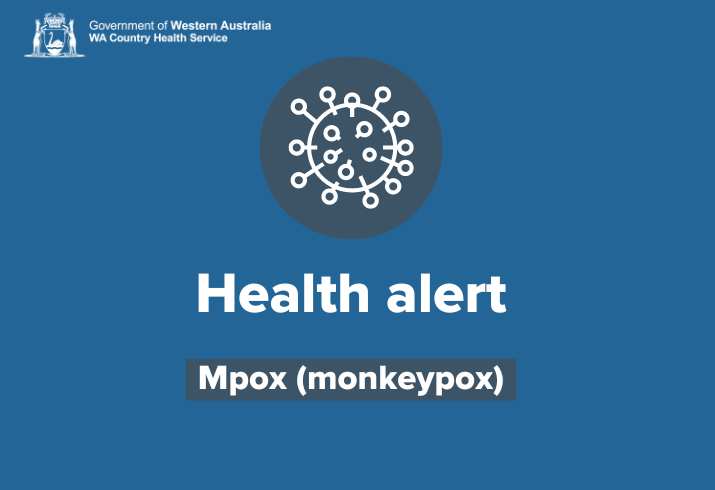Mpox cases prompts health warning

The following media release has been issued by the Department of Health.
WA Health is asking people at risk of contracting mpox (monkeypox) to be vigilant after recording two locally acquired cases of the virus in WA. WA Health’s Communicable Disease Control Director, Dr Paul Armstrong said high risk groups in the community should be alert for symptoms and seek testing promptly. “Mpox infections have been increasing in Australia over the past few months – particularly among sexually active men who have sex with men and through higher risk activities such as casual sex and multiple partners,” Dr Armstrong said. “If you have any symptoms suggestive of mpox – even if they are mild and even if you have had the mpox vaccine – you should contact your GP or sexual health service for an appointment. “Wear a mask, call ahead and cover up any rashes, bumps or pimple-like sores.” Mpox can be spread from person-to-person through skin-to-skin contact, including during sex, and contact with contaminated items such as bedding and towels, and rarely, through breathing in droplets from coughs and sneezes. Symptoms usually start within five days to three weeks of exposure to the virus and may include a rash that can look like bumps, pimples or sores, which later develop into fluid-filled lesions, pustules or ulcers. Some people also have fever, headache, muscle aches, backache, or enlarged lymph glands. The local cases – which are still being investigated – are the milder clade II strain of mpox and are not connected to the more severe clade Ib strain of mpox which is spreading through west and central Africa. Dr Armstrong said people with the clade II strain of mpox usually experienced a milder illness which may last for two to four weeks and resolves without specific treatment. Only a few people experience more severe illness. “Now that we are seeing locally acquired cases of mpox in WA, it’s really important to raise awareness of this virus and encourage people at risk to get vaccinated,” he said. “Vaccination plays an important role in reducing the severity of illness and preventing spread among those at highest risk of contracting mpox, which is important to protect people who may be vulnerable to severe infections.” The JYNNEOS® mpox vaccine is free for those considered to be at higher risk of developing the virus – including sexually active men who have sex with men (cis and trans) and their sexual partners, as well as sex workers and their sexual partners. Two doses at least 28 days apart are required for optimal protection. At this stage, the mpox vaccine is not being considered as a travel vaccination for people travelling to Africa, unless they are otherwise eligible. People can help prevent the spread of mpox by avoiding sex if they have any signs of sores or blisters, limiting sexual partners, and keeping contact details of new partners to help with contact tracing if needed. Condoms offer some protection, but only protect the area of skin covered (sores can be on and around other parts of the genitals and body). For more information and support go to Monkeypox (healthywa.wa.gov.au) or contact the sexual health hotline 9227 6178 (metro) or 1800 198 205 (country).

